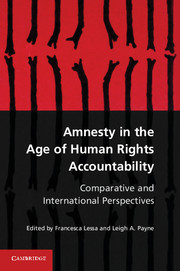Book contents
- Frontmatter
- Contents
- Contributors
- Foreword
- Acknowledgments
- Introduction
- Part I Theoretical Framework
- Part II Comparative Case Studies
- 3 Amnesties’ Challenge to the Global Accountability Norm?
- 4 From Amnesty to Accountability
- 5 Barriers to Justice
- 6 Resistance to Change
- 7 De Facto and De Jure Amnesty Laws
- 8 Creeks of Justice
- 9 Accountability through Conditional Amnesty
- 10 De Facto Amnesty?
- 11 A Limited Amnesty?
- 12 The Spanish Amnesty Law of 1977 in Comparative Perspective
- Conclusion Amnesty in the Age of Accountability
- Bibliography
- Index
- References
12 - The Spanish Amnesty Law of 1977 in Comparative Perspective
From a Law for Democracy to a Law for Impunity
Published online by Cambridge University Press: 05 June 2012
- Frontmatter
- Contents
- Contributors
- Foreword
- Acknowledgments
- Introduction
- Part I Theoretical Framework
- Part II Comparative Case Studies
- 3 Amnesties’ Challenge to the Global Accountability Norm?
- 4 From Amnesty to Accountability
- 5 Barriers to Justice
- 6 Resistance to Change
- 7 De Facto and De Jure Amnesty Laws
- 8 Creeks of Justice
- 9 Accountability through Conditional Amnesty
- 10 De Facto Amnesty?
- 11 A Limited Amnesty?
- 12 The Spanish Amnesty Law of 1977 in Comparative Perspective
- Conclusion Amnesty in the Age of Accountability
- Bibliography
- Index
- References
Summary
Without trying to be exhaustive, this chapter presents some of the main arguments found in the literature regarding the pursuit or avoidance of accountability for past political violence by transitional governments. After assessing the extent to which the Spanish case fits these arguments, I analyze the political process that led to the final approval of the 1977 Amnesty Law. The Spanish experience is then compared to those in Argentina and Chile to provide a deeper understanding of the limitations that characterize Spain’s transitional justice choice. Briefly, I argue that the role played by a very conservative judiciary, together with the absence of strong social demand for accountability and the lack of resolute political will on the part of the executive and most of the legislature, explain Spain’s adherence to amnesty over the pursuit of truth and justice.
SETTLING ACCOUNTS WITH THE PAST
The dilemma of how to settle accounts with the past without jeopardizing the transition to democracy was probably first addressed by Guillermo O’Donnell and Phillipe Schmitter and, subsequently, by Samuel Huntington. Guillermo O’Donnell and Phillipe Schmitter emphasized that, to understand democratization processes, it was necessary to consider the repressive role played by the armed forces, the extent of such repression and the form it had taken, as well as the length of time elapsed since the worst violations of human rights had occurred. They also identified a paradox: where situations in countries make it easy to bury the past, those same situations make it unnecessary to do so. They concluded moreover that “consensus among leaders about burying the past,” however useful it might be, “may prove ethically unacceptable to most of the population.”
- Type
- Chapter
- Information
- Amnesty in the Age of Human Rights AccountabilityComparative and International Perspectives, pp. 315 - 335Publisher: Cambridge University PressPrint publication year: 2012
References
- 1
- Cited by



